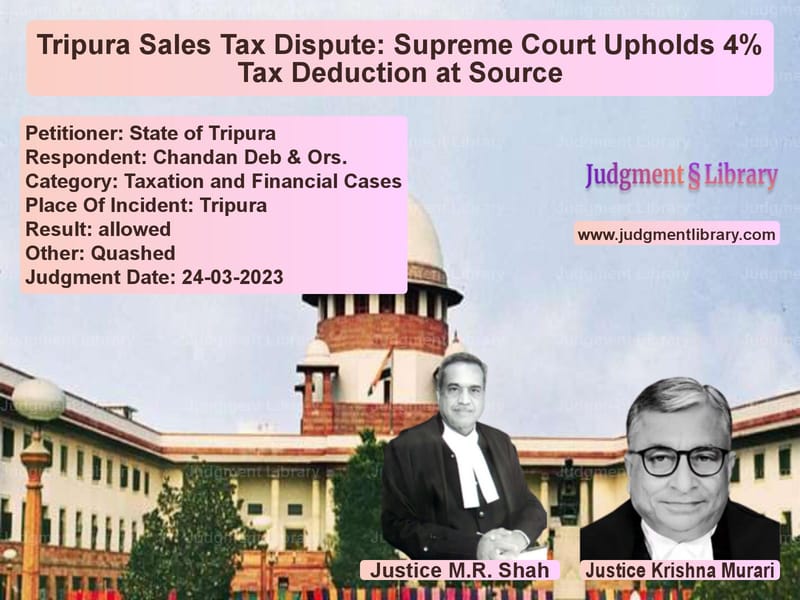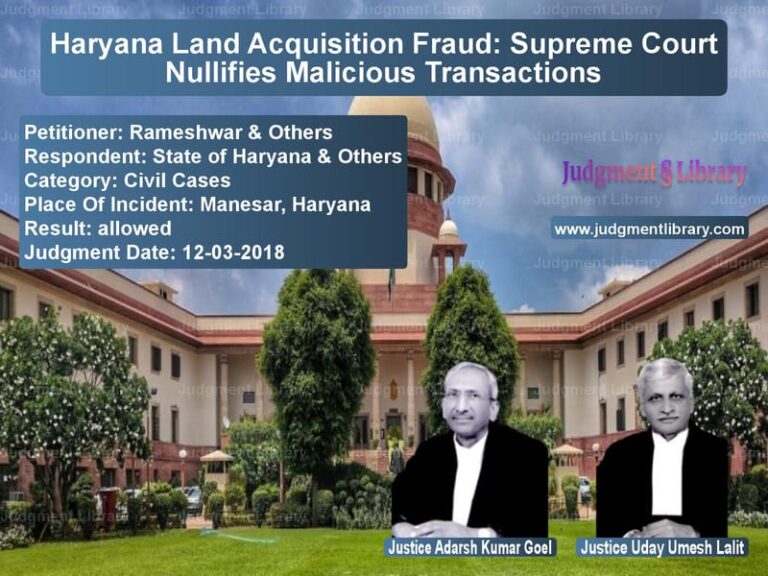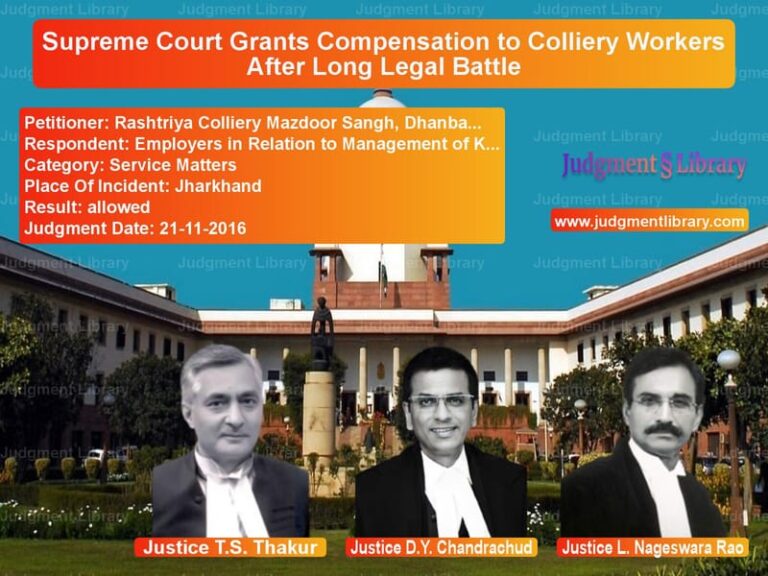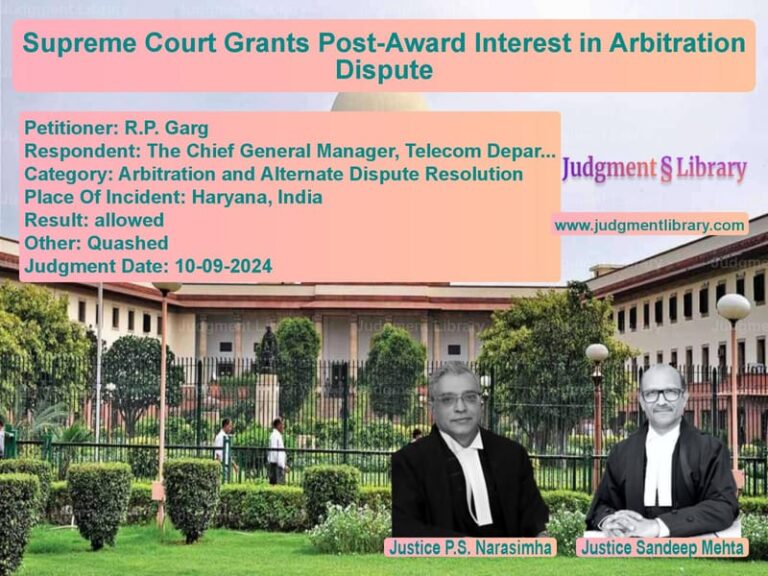Tripura Sales Tax Dispute: Supreme Court Upholds 4% Tax Deduction at Source
The case of State of Tripura vs. Chandan Deb & Ors. is a landmark ruling on the validity of tax deduction at source (TDS) under the Tripura Sales Tax Act, 1976 (TST Act). The Supreme Court ruled on whether Rule 3A(2) of the Tripura Sales Tax Rules, 1976, which mandated 4% tax deduction at source (TDS) for transfer of the right to use goods, was ultra vires to the TST Act. The ruling clarified key legal principles regarding tax deduction mechanisms, legislative competence, and the distinction between tax imposition and collection methods.
Background of the Case
The case arose when the Government of Tripura mandated tax deduction at source (TDS) at a rate of 4% on transactions involving the transfer of the right to use goods under Rule 3A(2) of the TST Rules. The affected businesses, primarily those supplying vehicles on hire, challenged this rule, arguing that it was beyond the legislative power of the state government since the TST Act did not explicitly provide for such a deduction.
Key events leading to the dispute:
- 1992: The Government of Tripura issued a memorandum directing companies such as ONGC, GAIL, and FCI to deduct 4% tax at source on payments made for hiring vehicles.
- 2004: The Tripura VAT Act replaced the TST Act, but disputes concerning the period before 2004 remained unresolved.
- 2007: The Gauhati High Court declared Rule 3A(2) of the TST Rules ultra vires and struck it down.
- 2023: The Supreme Court overturned the High Court’s ruling, upholding the validity of Rule 3A(2) of the TST Rules.
Arguments by the State of Tripura
The State of Tripura defended the validity of Rule 3A(2), arguing:
- Section 3(1) of the TST Act imposed a tax on the transfer of the right to use goods, including vehicle hire transactions.
- Rule 3A(2) was a procedural mechanism for tax collection and did not impose a new tax.
- The provision merely required businesses making payments for the transfer of right to use goods to deduct tax at source and remit it to the government.
- As per Section 44 of the TST Act, the government had broad rule-making powers, including provisions for tax recovery mechanisms.
Arguments by the Respondents
The respondents, who were primarily vehicle suppliers, argued:
- Rule 3A(2) imposed a tax burden on businesses that were not registered dealers under the TST Act.
- The TST Act did not explicitly authorize TDS provisions for transactions involving the transfer of the right to use goods.
- The rule effectively created a new tax obligation beyond what was legislatively sanctioned.
- Since they were not “dealers” selling goods, they should not be subject to sales tax.
Supreme Court’s Judgment
The Supreme Court ruled in favor of the State of Tripura, overturning the High Court’s decision and upholding Rule 3A(2) of the TST Rules. The key findings of the Court were:
1. TDS Provisions Are a Valid Tax Recovery Mechanism
The Court reaffirmed that Rule 3A(2) did not introduce a new tax but was merely a collection mechanism:
“Rule 3A(2) does not impose a tax; it only provides for tax deduction at source, ensuring efficient tax collection and compliance.”
2. The Transfer of Right to Use Goods Constitutes a Sale
The Court emphasized that as per Section 2(g) of the TST Act, the transfer of the right to use goods is considered a sale and is taxable:
“Any transfer of the right to use goods falls within the definition of ‘sale’ under Section 2(g) and is subject to sales tax.”
3. The Government Has the Authority to Enforce Tax Deduction at Source
The Supreme Court found that the Tripura government had the legislative competence to implement tax deduction at source under Section 44 of the TST Act:
“Section 44 provides the government with broad rule-making powers, including mechanisms for tax collection. Rule 3A(2) falls within this scope.”
4. The High Court Erred in Declaring Rule 3A(2) Ultra Vires
The Court criticized the Gauhati High Court’s reasoning and held that the rule was legally valid:
“The High Court misinterpreted the legislative framework. The rule does not contradict the TST Act but complements its enforcement.”
Final Ruling
The Supreme Court:
- Overturned the Gauhati High Court’s ruling.
- Held that Rule 3A(2) of the TST Rules was valid and enforceable.
- Directed companies to continue deducting 4% tax at source on transactions involving the transfer of the right to use goods.
- Clarified that tax deduction at source is a valid mechanism for ensuring compliance with sales tax obligations.
Conclusion
This ruling reaffirms the authority of state governments to implement tax deduction at source (TDS) as a collection mechanism under their legislative powers. By upholding Rule 3A(2), the Supreme Court has provided clarity on the taxation of transactions involving the transfer of the right to use goods, ensuring effective tax enforcement while maintaining the constitutional validity of tax laws.
Petitioner Name: State of Tripura.Respondent Name: Chandan Deb & Ors..Judgment By: Justice M.R. Shah, Justice Krishna Murari.Place Of Incident: Tripura.Judgment Date: 24-03-2023.
Don’t miss out on the full details! Download the complete judgment in PDF format below and gain valuable insights instantly!
Download Judgment: state-of-tripura-vs-chandan-deb-&-ors.-supreme-court-of-india-judgment-dated-24-03-2023.pdf
Directly Download Judgment: Directly download this Judgment
See all petitions in Income Tax Disputes
See all petitions in GST Law
See all petitions in Tax Evasion Cases
See all petitions in Banking Regulations
See all petitions in Tax Refund Disputes
See all petitions in Judgment by Mukeshkumar Rasikbhai Shah
See all petitions in Judgment by Krishna Murari
See all petitions in allowed
See all petitions in Quashed
See all petitions in supreme court of India judgments March 2023
See all petitions in 2023 judgments
See all posts in Taxation and Financial Cases Category
See all allowed petitions in Taxation and Financial Cases Category
See all Dismissed petitions in Taxation and Financial Cases Category
See all partially allowed petitions in Taxation and Financial Cases Category






